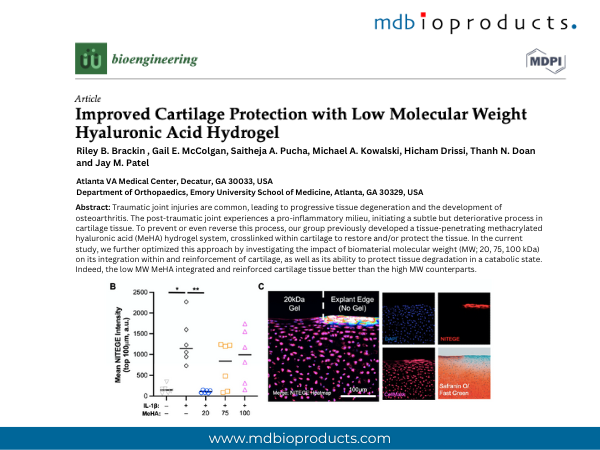
Featured Publication in Focus: Improved Cartilage Protection with Low Molecular Weight Hyaluronic Acid Hydrogel
Feb 19 , 2024
Authors:
Riley B. Brackin , Gail E. McColgan, Saitheja A. Pucha, Michael A. Kowalski, Hicham Drissi, Thanh N. Doan and Jay M. Patel
Atlanta VA Medical Center, Decatur, GA 30033, USA.
Department of Orthopaedics, Emory University School of Medicine, Atlanta, GA 30329, USA.
MDPI. Bioengineering. 27 August 2023.
----------------------
Products referenced:
Catalogue # 1042003
Aggrecan Antibody, C-terminal neoepitope NITEGE, 100 ug
----------------------
ABSTRACT
Traumatic joint injuries are common, leading to progressive tissue degeneration and the development of osteoarthritis. The post-traumatic joint experiences a pro-inflammatory milieu, initiating a subtle but deteriorative process in cartilage tissue. To prevent or even reverse this process, our group previously developed a tissue-penetrating methacrylated hyaluronic acid (MeHA) hydrogel system, crosslinked within cartilage to restore and/or protect the tissue. In the current study, we further optimized this approach by investigating the impact of biomaterial molecular weight (MW; 20, 75, 100 kDa) on its integration within and reinforcement of cartilage, as well as its ability to protect tissue degradation in a catabolic state. Indeed, the low MW MeHA integrated and reinforced cartilage tissue better than the high MW counterparts. Furthermore, in a 2 week IL-1β explant culture model, the 20 kDa MeHA demonstrated the most protection from biphasic mechanical loss, best retention of proteoglycans (Safranin O staining), and least aggrecan breakdown (NITEGE). Thus, the lower MW MeHA gels integrated better into the tissue and provided the greatest protection of the cartilage matrix. Future work will test this formulation in a preclinical model, with the goal of translating this therapeutic approach for cartilage preservation.
To continue reading and to download the publication:
